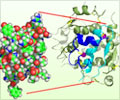
The group was tested for blood sugar levels and followed over a period of 10-15 years to detect signs of Alzheimer's.
During that time, around 16 percent developed the neuro-degenerative disease that affects cognitive functions -- chiefly loss of memory, behavior and social adaptation.
After the participants died, researchers examined their brains for plaques and tangles, which are physical signs of Alzheimer's -- and found that 65 percent had plaques.
The researchers found that people who gave abnormal results for blood sugar control had an increased risk of developing plaques.
Plaques were found in 72 percent of people with insulin resistance and 62 percent of people with no indication of insulin resistance -- the stage before diabetes when insulin, a hormone in the body, becomes less effective in lowering blood sugar.
Advertisement
However, he added, "it's possible that by controlling or preventing diabetes, we might also be helping to prevent Alzheimer's disease."
Advertisement
"With the rising obesity rates and the fact that obesity is related to the rise in type 2 diabetes, these results are very concerning," he added.
An estimated 37 million people worldwide, including 5.3 million in the United States, live with dementia, with Alzheimer's disease causing the majority of cases, according to the World Health Organization (WHO).
Source-AFP














